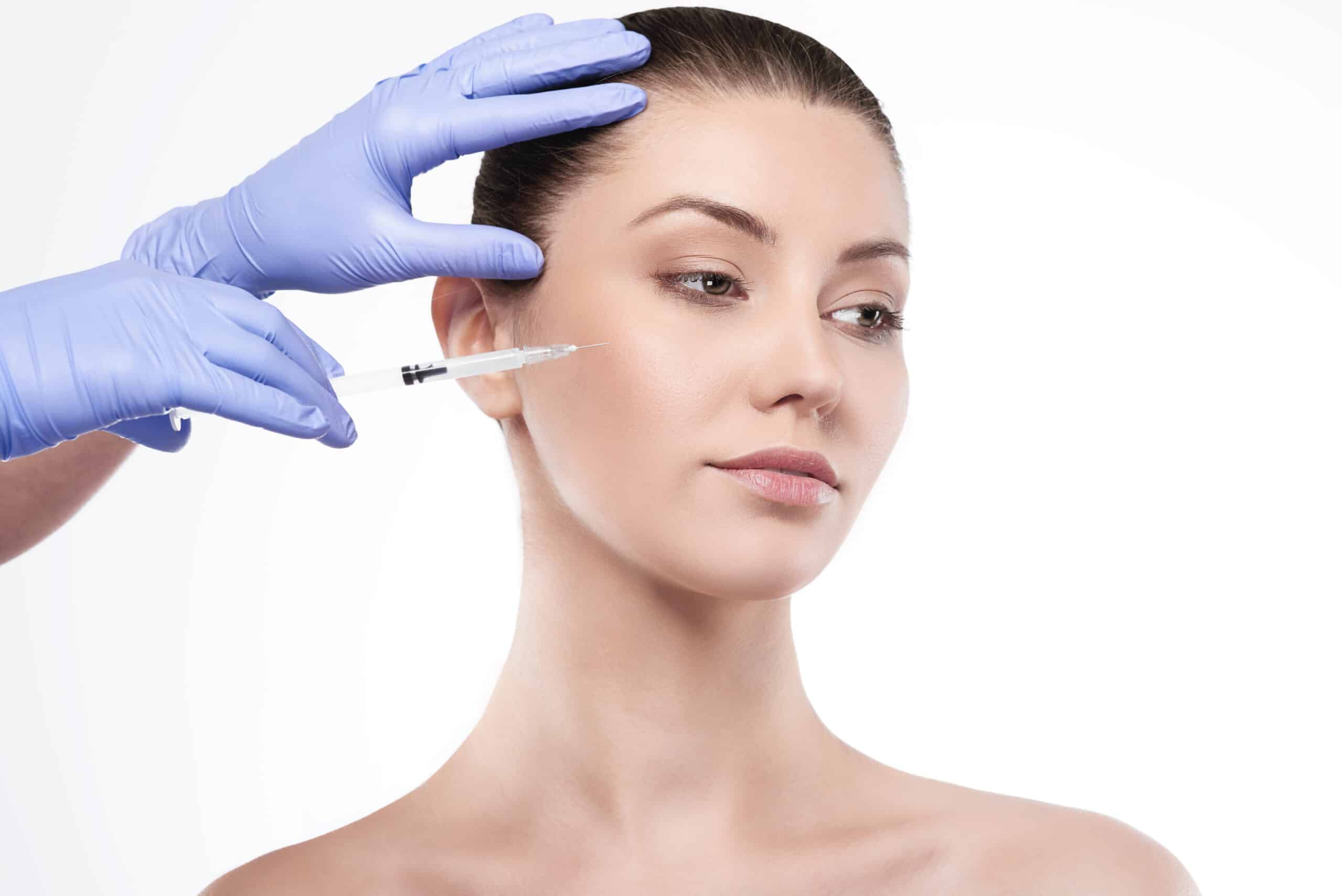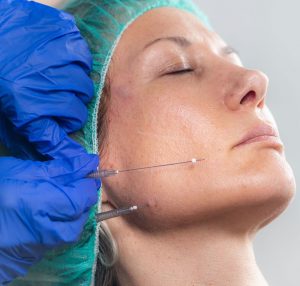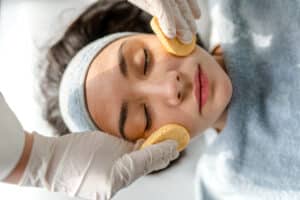PDO Thread Lift
Home > Aesthetic > PDO Thread Lift
PDO
PDO
Thread Lift
What Is PDO Thread Lift?
Also known as PDO thread treatment. PDO Thread Lift is a minimally invasive cosmetic medicine technique using dissolvable threads that are implanted into the skin to lift sagging. PDO Thread Lift Treatments are intended for facial rejuvenation (lifting sagging skin (lower face, mid face, eyebrows), filling in wrinkles, adding volume to areas) and/or providing a similar effect to a face lift.
Thread lifting is a very desired and popular cosmetic medicine technique across the world. PDO thread lifting is now available in Calgary, at LiveYounger and it offers many benefits over fillers and other cosmetic treatments. It bridges the gap between injectable filler with skin tightening and facelifts. What this means to you is that you can achieve more lifting without your face looking too full and puffy. It is a non-surgical facelift that can provide results in a very short time. It offers lifting that is a game changer in the field of aesthetic medicine.

How Does The Thread Lift Work?
In general, a Thread Lift procedure works by implanting special dissolvable thread(s) into the subcutaneous skin layer (innermost layer of the skin made of connective tissue and fat). The thread is used to ‘lift’.
The components of the threads stimulates the production of new collagen production while the thread(s) dissolve over time. Depending on the thread type and variation, it can fill in wrinkles, give a facial rejuvenation and similar effects as a face lift.
Who Should Get A PDO Thread Lift?
Patients with mild to moderate skin drooping or sagging skin are considered good candidates for a Thread Lift. Eligibility for the procedure will depend on
- The age of the patient
- Their skin type
- If there’s enough soft tissue volume
- And if they have facial fat. Patients who have very thin, very aged, very thick or extremely damaged skin, and/or excessively saggy skin are usually unsuitable to undergo a Thread Lift procedure
We help you determine this at your consultation.

What Areas Of The Face Or Body Can You Do PDO Thread Lift On?
PDO threads have been used for years for other applications (gynaecological disorders eg. ‘lifting’ and stabilising the uterus/ bladder, suturing surgical incisions and deep lacerations, etc.)
For cosmetic treatments, PDO thread lifts can be used to correct/modify:
- “Marionette Lines” (folds near the mouth/chin from smiling)
- Nasolabial Folds
- Jawline
- Jowls
- Neck
- Crow’s Feet (wrinkles near eyes)
- Eyebrows / brow line: for lifting and shaping the brow
- Eye shape: most popular is the Fox eye
- Cheeks
- Under Eye Area
- Saggy knees and abdominal skin
A nano peel is the newest way to avoid downtime and get great results.
How Soon Will You See Results From Threading? (How long do PDO threads take to work?)
There’s initially a 30-40% immediate improvement which is often immediately seen after the procedure. The remaining results will appear over the next 6 months as the collagen builds around the inserted threads while the threads are dissolving. For areas that use larger threads also provide skin rejuvenation and improved texture of the skin. Overall results can last 12-24 months or longer.
Who Can Perform PDO Thread Lift Procedures?
Depending on the country, doctors and licensed medical professionals who have completed courses or have previous qualifications in injections, dermal fillers or Botox, can be eligible to take and complete the PDO thread lift course. Our doctor has been trained on this technique. She has experience performing certain plastic surgery procedures including deep trauma to the face and body, crush injuries to the fingers and Gynaecological surgeries like hysterectomy and Caesarean sections. This gives her a background dealing with deep sutures, and the use of the different surgical materials and threads/ sutures.
How Much Does Thread Lifting Cost?
The cost for thread lifting varies on the area that the treatment is performed on and the amount of treatments required. Compared to plastic surgery, thread lifting costs about ¼ as much, with results that can rival plastic surgery (of course, for the ideal candidate). Some cases, those with more severe sagging, are best treated with plastic surgery.
PDO Threads: Lunch Time Face Lift
Frequently Asked Questions on PDO Thread Lifting
What do I need to do before my thread lifts? (prepping)
Pre-care starts at least one week before the procedure and you will be advised how to prepare for it.
- Inform your surgeon if you’re taking any medications
- Avoid stress and try to get enough sleep before your appointment
- Avoid any known food allergies, or anything that can trigger inflammation
- Avoiding alcohol and smoking at least 1 week before procedure
- Avoiding certain medications (blood thinners, NSAIDs, Ibuprofen, etc.)
- Avoiding certain food and supplements (omega fish oils, Vitamin A, E, teas, garlic, etc.)
Don’t wear any makeup (any makeup will be removed before the treatment). We recommend you shower prior to arrival. Arrive at least 15-30 minutes before the appointment to do any related paperwork and discuss the treatment.
How do I sleep after PDO threads?
Post-care instructions advise patients to sleep face-up and in an elevated position. This should help minimise the risk of putting unnecessary pressure on the operated area, infecting it or breaking the thread
How long do the effects of a Thread Lift last?
Depending on the type of thread(s) used, it can take 6-15 months for the threads to dissolve/get absorbed by the body and at the same time allow the skin to build collagen in the area. This means the results are usually more visible after six weeks and by 6 months. Getting enough fluids, diet, sleep and proper care, the procedure’s effects can last around three years (maybe even up to four years with a touch-up treatment).
At [Better], we understand cellular ageing and the most modern techniques to protect cells and regenerate healthier, younger cells. Through Longevity and Functional Medicine, we guide you on prolonging the results of your treatment and rejuvenating your skin for an overall more youthful result.
Can you feel the threads after getting a Thread Lift?
It is possible to feel the threads after the procedure since it can depend on the thickness of the thread used, how sensitive the skin is and if there’s still any swelling or bruising. Even if the threads may be placed more superficially for it to be felt, it will be temporary since the threads will dissolve and are absorbed by the skin.
How long do the effects of a Thread Lift last?
In general, the results of a PDO Thread Lift can be expected to last 2-3 years. Depending on the type of thread(s) used, it can take 6-15 months for the threads to dissolve/get absorbed by the body and at the same time allow the skin to build collagen in the area. This means the results are usually more visible after six weeks. Getting enough fluids, diet, sleep and proper care, the procedure’s effects can last around three years (maybe even up to four years with a touch-up treatment).
How long does it take to recover from a PDO Thread Lift?
Since the recovery time is really fast, some patients can opt to go straight to work right after the procedure. Recovery time for any possible bruising or swelling can last up to a week. Always follow everything that your doctor prescribed in the post-op care instructions, which can include some or any of the following:
- Painkillers
- Prophylactic antibiotics (to prevent any risk of infection)
- Ice packs to minimise swelling
- Advice to avoid wearing makeup and avoid strenuous actions on the skin and strenuous activities
How many threads do I need?
Depending on the area that needs to be treated, the number of threads that are used can range between 2 to 10 in one session (for lifting). Note that this will also depend on what other procedures you may want. Your doctor will take into consideration the type of thread that will be needed. For skin firming and thickening eg. on the neck or under eyes, you can have 20-50 or more threads placed. This is not thread lifting, but using threads to enhance skin quality.
For example, the average threads used for a standard thread lift would be 8 threads total. That’s 4 threads on each side of the face = 2 on the cheekbones and 2 on the lower face. This isn’t always the case because other patients may need more, or less, depending on the state of the skin, their age, etc.
To determine exactly how many threads you’ll need, your cosmetic surgeon will check on the following factors:
- Patient’s face type and the actual skin’s ageing process. Even if the patient can be considered as a candidate, every patient’s case will be different. With patients with “heavy” faces, they may need to have multiple sessions and will need more threads than a patient with a more hollow face.
- Patient’s expectations. Some patients may expect to have the exact same results as an actual facelift or have a particular idea of what they’ll look like after the Thread Lift procedure. It’s important that the proper expectations are set, with a realistic goal of what the area they want lifted/filled will look like after the procedure.
- If there are any other treatments to be done. Patient’s should remember that Thread Lifts are not the only procedure they can use for their non surgical face lift’. There are other minimally invasive procedures (like fillers, combined with Botox and skin tightening) that can add to the result. The thread lift can address lifting and sagging. Other threads can help firm up skin and brighten it. Some types of threads fill hollows eg. the nasolabial folds.
Neuromodulators (like Botox, Nucieva, Dysport and Xeomin) help wrinkles at the areas of facial movement that are not treated with your Threadlift.. SkinTyte and Thermage™ address overall collagen strengthening and tightening. Fillers add volume to the
What kinds of activities can you not do after PDO thread lift?
No matter how minor the Thread Lift procedure was, it’s very important to follow all the post-care instructions to make sure no complications arise. The collated list below may be extensive, but always double check with your surgeon to make sure:
- No makeup for the first 24-48 hours.
- Avoid touching, wetting, washing face for the first 12-24 hours
- Avoid swimming for the first week.
- No pulling on the skin (avoid extreme facial expressions, no face massage, no facials, scrubbing or exfoliating for at least 3 weeks). You can still wash your face, just make sure to be very gentle when cleansing.
- Avoid smoking and drinking alcohol.
- Inform your doctor if you’re taking any blood thinning medication (NSAIDs, blood thinners, anticoagulants, MAOIs) and supplements (Vit. A, C, E, fish oil, turmeric, ginseng, gingko biloba, garlic supplements). Only your doctor can advise what medications & supplements you can actually take during the one week recovery period.
- Avoid strenuous physical activity / no exercising.
- Avoid saunas and walk-in freezers – avoid too much body temperature changes
- Avoid sleeping face-down. Patient’s are advised to sleep face-up and in an elevated position.
- Avoid any dental treatment at least for the first two weeks after the thread lift.
- Any straining or putting pressure on the face (to avoid thread misalignment).
- Avoid drinking with a straw for at least a week to lessen any facial muscle straining. Be aware that they may suggest drinking liquids or consuming soft food during the week you need to heal.
- Chewing gum should be avoided (at least two weeks).
- No smoking or vaping for 2 weeks after.
How Can I Book an Appointment for PDO Thread Lift Consultation?
To find out if you are a good candidate for a PDO thread lift procedure, it is best to book an appointment by calling 403-237-2353
Live Younger Articles On Health
All those years of writing prescriptions, I realized my patients weren’t really getting BETTER. A drug for this and a drug for that…the same dose for everyone, even though every person is a unique individual. Then I discovered a Better way!

Exploring the World of Medical Spa Treatments: A Path to Wellness and Beauty
Medical spas, or medspas, have gained significant popularity in recent years, as people seek non-invasive, therapeutic treatments to enhance their health, appearance, and overall well-being.
MTHFR : How It Impacts Your Cancer Risk.
Dear The most common gene that most people have heard about is MTHFR. It is the gene that converts folate (which comes from food) into
Tear troughs and Eyebags
As you age, one of the first places aging shows is around the eyes. Eyelid skin is very thin. Loss of collagen and elastin causes
